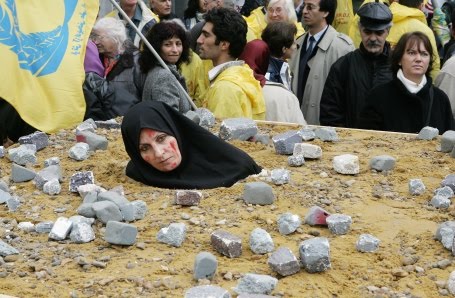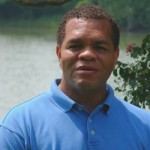
Reenactment of a stoning. PhotographerThierry Roge/Reuters
My colleague Jeff Coleman recently wrote the following poem about the stoning of women in places like Somalia, Iran, and Taliban-controlled regions of Afghanistan. He tells me the poem was triggered by an article in the New York Times about Iranian executions, but for me it brought to mind the Somalian stoning two years ago of a 13-year-old for the crime (so the parents reported) of being raped.

Jeff Coleman
Poetry seems powerless in the face of human brutality. Islamic fundamentalists bent on punishing women aren’t going to be slowed down in the slightest by what poets write. Jeff, however, has a useful perspective since he has been putting together an anthology of civil rights poetry for Duke University Press. Although poetry couldn’t save Emmett Till or the four school children in the Birmingham Church bombing, it could stand witness. It could separate the incident from all the newspaper headlines and invoke a higher judgment. It could get us to reflect upon the meaning. Poetry carves out a special place for contemplation.
In that way, poetry played a role in the Civil Rights movement, and maybe poems like Jeff’s will make some difference in the worldwide struggle for women’s liberation. At the very least, they get us to notice.
In “First Light,” a lighthearted walk on the beach listening to Bob Dylan (“everybody must get stoned”) suddenly turns dark as the poet remembers encountering a snagged rock fish. One association leads to another and suddenly Jeff “sees” a woman buried in the sand. The image sears his consciousness, and though he tries to “fast forward” through the image, through he tries to disavow all connection with such incidents—“This is not my world,” “These are not my people”—his carefree mood has been shattered. He feels like wounded prey, a beached fish pierced by a hook.
Read the poem after the break:
First Light
This morning on the beach
While the sky was not quite born
And water was not yet waves
I stared into the half-opened eye of the sun
And heard “Rainy Day Women #12 and 35”
Jangling through my headphones.
The sun smiled, winked, and nodded to my right.
It’s a game we play on mornings we’re alone:
I stare across the horizon
And the winking eye sends a vision my way.
So to my right I glanced
And there she was,
A woman I had never seen
But even in the pre-dusk light
I could tell she had brown eyes
Black hair, an olive glow.
And she was standing,
Buried to her breasts in sand.
Last week, someone snagged a rockfish here
And left it on the shore,
The hook still piercing the mouth.
No one bothered to move or cover it with sand
Kicked from a sandal or bare foot.
There was something about the process
Of unbecoming that appealed to me.
The breakdown, maybe. The denouement.
The scale to bone reversal.
On the first day,
Before the flies, maggots, and stench
There were birds—curious and possibly starving birds.
Hitchcockian birds
They were not, but the thought always appears
And takes flight once hungry flocks gather.
Later in the week not much was left.
The mouth around the hook had disappeared,
The eyes, too, had dissolved into the warmth of the shore
Or had entered the beak of a gull—
Nature once again taking care of nature,
As if men and women never existed.
She was alone at the mercy of men
Defending the honor of men.
I watched as she closed her eyes
Before the first stone was cast
As she praised or cursed Allah—
Maybe both in the same pummeled breath—
While several men took turns with her,
Each hurling a stone to her face,
Shouting words for slut, whore, die!
Soon the volume went mute for her.
She could no longer hear the blood
And then her left ear, too, was smashed
Crushed by arms wielding weapons
Honed from fear and faith,
The kind antiquity has never managed to release
But continues to unleash
As if a phantom, repressed, has returned
To haunt forever the living and the dying.
I couldn’t watch much more
Or listen to her screams.
This is not my world, I told myself,
These are not my people.
So I stood, pressed Fast-forward
And walked back, slowly, to my life
With the full glare of the sun
Penetrating my back,
Following me home like wounded prey.
Jeff Coleman is the author of Spirits Distilled, a collection of poetry published by Red Hen Press (2006).

